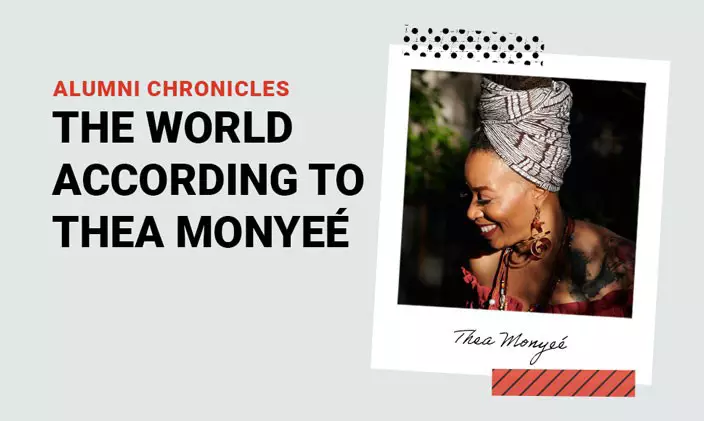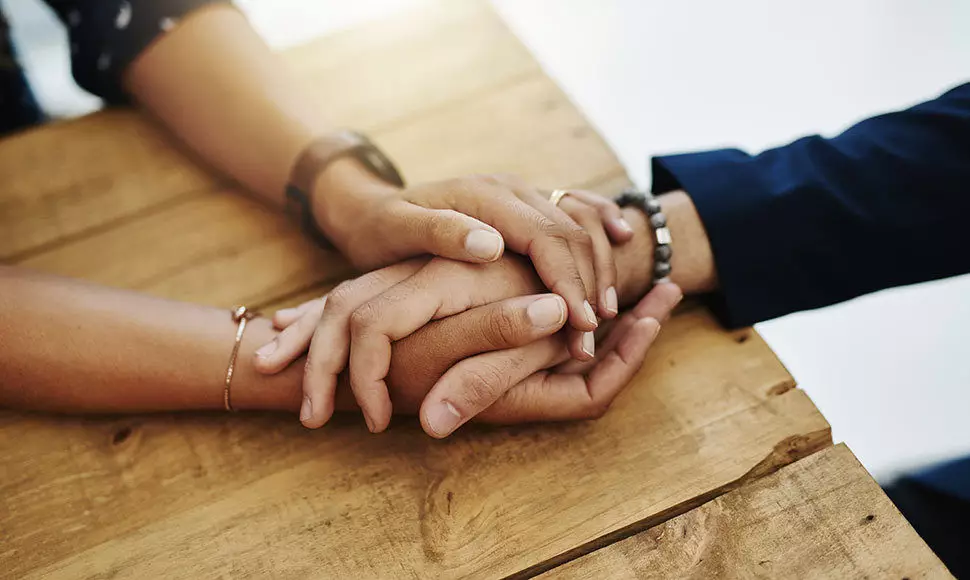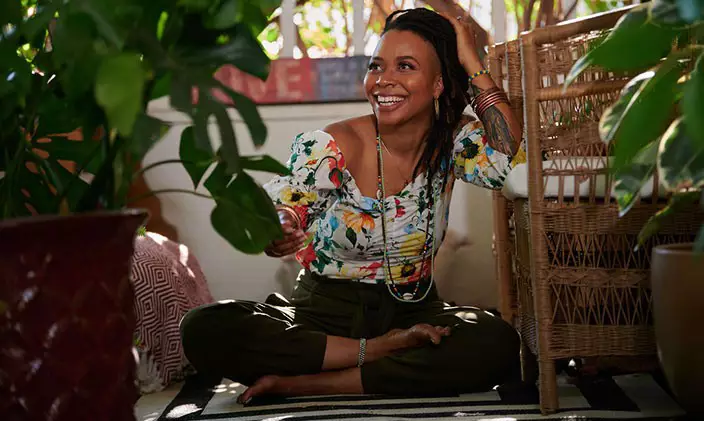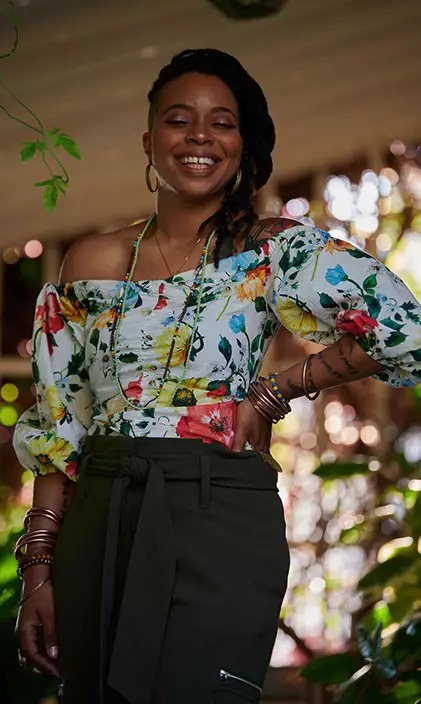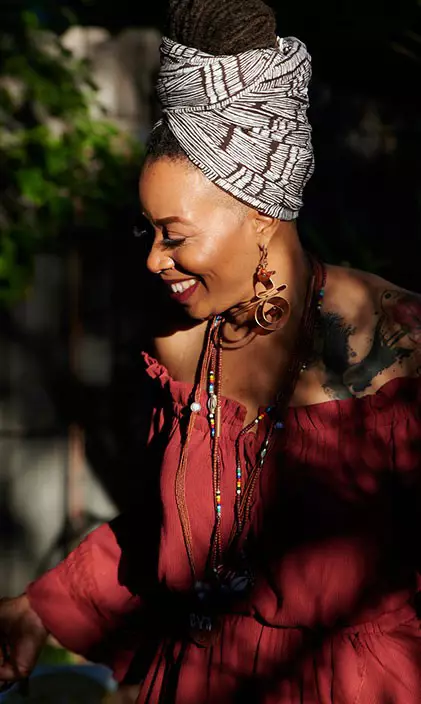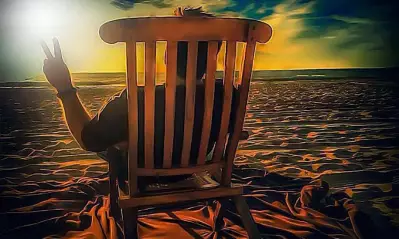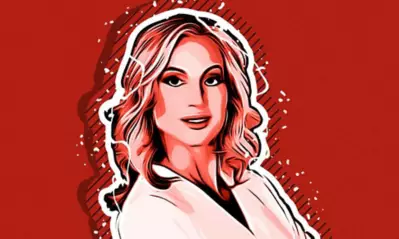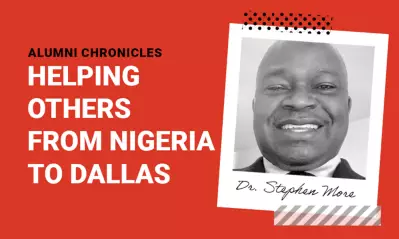Discover more stories in our Alumni Chronicles Magazine!
The world according to Theaä»Monyeûˋ
By Elizabeth Exline
Thea Monyeûˋ is a poet, , a podcaster, a therapist and . She has performed in a variety of roles and venues, from Def Poetry to . She can deliver a dressing down as powerfully as she can a keynote speech. And while she defies categories as a rule, thereãs one that manages to capture both her work and who she is as a person: storytelling. For Monyeûˋ sees connections in everything; indeed, she always has.
ãThe older you get or the further you get in your journey, you realize you were always who you were. You just went through different iterations of being,ã Monyeûˋ observes. ãI was that kid who felt everything was alive and greeted everything like it was alive. ãHello, cup! Hello, car! Hello, stuffed animal!ã I was very conscious of having a relationship with everything around me, and I didnãt know at the time that that was also a spirituality within me.ã
ä»
Speaking her truth
Monyeûˋ would come to know her spiritual side well, but she took a nonlinear path to get there. As a child, she did well in school and thought sheãd be a novelist or a pediatrician.
But when she got to college, she floundered. The pressure of having to know what to do with her life, to be certain at 18, while simultaneously dealing with her parentsã deteriorating marriage proved too much.
Monyeûˋ stepped back. At the behest of friends, she went to Da Poetry Lounge, performed toward the end of an open-mic session, got a standing ovation and was hooked.
ãI was there every week,ã Monyeûˋ recalls. ãI was writing ferociously, and that led to me doing Def Poetry, which, at that time [in the early 2000s], was like the biggest thing spoken word had.ã
ä»
Poetry tapped into a love of writing Monyeûˋ had had since childhood. It allowed her to crystalize her emotions, experiences and viewpoints.
It also led to her working with children in juvenile detention. As an artist, she could teach writing to youth who had run into trouble with the law, and that allowed her to explore another passion sheãd cultivated since she was a girl learning to keep the peace in her home: therapy.
ãThatãs when I decided I knew what I wanted to do,ã Monyeûˋ says. ãI went back [to school] and got my BS in Human Services [now a Bachelor of Science in Social Work] at SM缧äùª, which I loved. I went right back and got my masterãs in counseling. ãÎ I felt like a completely different student at that point in my life.ã
ä»
'Decolonizing' and healing
At that point, Monyeûˋ was a completely different student. She was older. She was a mother. And she was opening up to an awareness that would inform her work as both a therapist and an artist.
That awareness centered on the same interconnectedness sheãd tapped into as a child. Just as sheãd felt a kinship to animate and inanimate objects alike, she began to explore unorthodox ways of helping people. She participated in in which patients are supported with social services and therapy as well as family and community resources.
ãIt was like you were never working on those cases alone,ã Monyeûˋ says. ãYou became a part of the family for a year or two.ã
This experience, combined with an approach to therapy that Monyeûˋ playfully describes as gumbo ã ãthrow anything in the pot and see what worksã ã led Monyeûˋ to her current work in healing through ãdecolonization.ã
Decolonization is a big claim and one that Monyeûˋ is careful to explain. ãI think people think race, but I really think in terms of culture and ethnicity, because many cultures have been colonized by other cultures.ã
Just as the world is home to many plants and many animals, so too must it support many people, cultures and personalities in order to thrive.
ãThe idea that there should be one type of human or one way for humans to live is anti-creation,ã Monyeûˋ points out.
Her solution? Focus on finding individual freedom and joy within a culture that can sometimes be at odds with that. This is the essence of the decolonization work Monyeûˋ does with a cohort of educators, doctors and therapists.
As a therapeutic process, decolonization works to identify and ãunlearnã the ideas and practices that restrict or oppress people.
Monyeûˋ works to give people language, awareness, intention and a new framework for understanding life and finding joy.
ãJoy is our metric, and that follows through everything we do,ã she says.
ä»
ãEverything,ã by the way, includes a lot. In addition to her therapy work, Monyeûˋ has called Blood & Bajareque that explores concepts of identity and love. She hosts a podcast called Shaping the Shift, and she facilitates counseling and diversity, equity and inclusion (DEI) consultations under the umbrella of MarleyAyo, a portmanteau of the surname of legendary singerãsongwriter Bob Marley and ayo, a Yoruba word meaning joy. She even facilitates a ãwhite-identified racial healing cohortã known as FreeJoy Experience.
Joy, after all, is for everyone.
A spiritual awakening
The therapeutic framework for decolonization is functional but rooted in spirituality. Monyeûˋ was raised in the Christian faith, but one that also wove in traditions from Africa, the Caribbean and Central America. She recalls going to church in her familyãs Cadillac every week as clearly and happily as she remembers little rituals that were distinctly outside the realm of traditional Christianity.
ãMy grandma, when she would comb our hair, she would take the hair and she would burn it up,ã Monyeûˋ says. ãAnd that sounds a little witchy.ãä»
This and other traditions laid the groundwork for a spiritual reckoning that arrived for Monyeûˋ around 2016.
ãI was really grieving that I didnãt have a practice that connected me to my ancestors, that I didnãt have language anymore," she says. "I was feeling that part of my Black American experience where I was feeling the loss of my culture.ãä»
Monyeûˋ eventually came into contact with a spiritual leader who introduced her to the traditions and practices native to Nigeria. ãItãs been the most expansive experience of my life,ã she observes.
In Nigeria, spirituality is integrated into daily life. Whereas ãreligionã captures a certain category of belief and practice in the West, daily life in Africa integrates the spiritual.
ãHow you live is your religion,ã Monyeûˋ explains.
Really, that's not so different in the West. What we prioritize is what we worship. Itãs just that ãreligionã or ãspiritualityã doesnãt usually make it into the top three.
For Monyeûˋ, however, itãs a different story.ä»ä»
ãDifferent divinities support [your] path,ã she explains. ãThe different elements of nature support that path. Different ancestors had to put that path or blueprint to you and what you are here to bring into the world while youãre here. And so itãs all tied to your character and your destiny. The greater your character is, the more your destiny can come forward. And your destiny is here to serve a purpose in the world.ãä»
